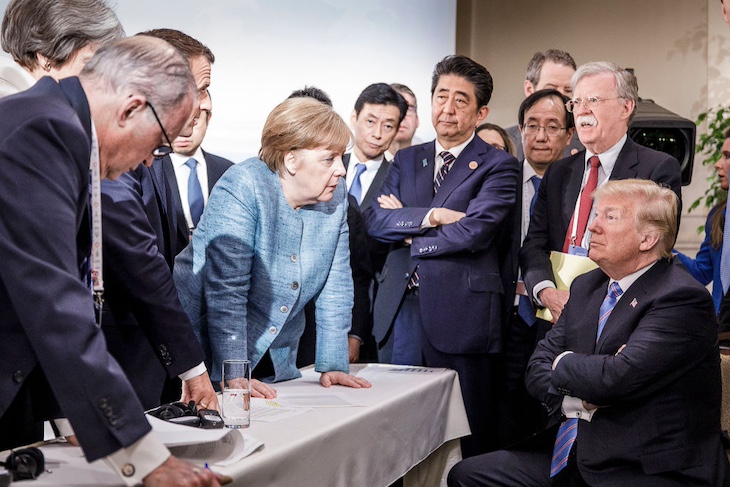When the history of the twentieth century is written, one of the questions that will puzzle historians is the sanctification of Angela Merkel, whose memoir is published today.
Merkel was Time magazine’s Person of the Year in 2015, and chosen as the third most powerful person in the world by Forbes in 2016.
When she stepped down as Chancellor in 2021 after 16 years in power, she was described by the BBC as someone who ‘has given her country what it expects from a leader: a voice of calm in a turbulent and shifting world’. In its tribute to Merkel, the Washington Post described her as ‘one of the savviest and most powerful leaders in the world’.
Merkel would probably have been remembered as a dull and plodding leader had not a series of events unfolded in quick succession between August 2015 and November 2016
Merkel continues to exert a curious hold over some commentators, three years after she left office, during which time Europe – and particularly Germany – have suffered economic and social hardship as a result of her short-sighted, arrogant and incompetent leadership.
In a lengthy interview with the Sunday Times at the weekend – an interview for which the newspaper will surely win Private Eye’s coveted Order of the Brown Nose – the journalist suggested it was like meeting Queen Elizabeth II. ‘Her impact is electrifying,’ they simpered. ‘It’s as if living history has just walked through the door.’ The interview concluded with the star-struck journalist telling Merkel ‘how many people asked me to beg her to return to political life’. Who are these people? Who in their right mind would wish to see Merkel back in the political saddle?
In the first half of her reign, Merkel was often the target of unflattering profiles in the western media. Merkel was described by the Guardian in 2011 and the Independent two years later as uncharismatic. The Independent said her oratory skills were as ‘inspiring as the eurozone quarterly growth figures’, and the Guardian quoted a German official remarking that ‘she doesn’t light many people’s fires’.
Merkel was especially unpopular with the European left. In 2013 Massimo d’Alema, Prime Minister of Italy in the late 1990s, said Merkel’s political vision ‘was bad and lacked courage’. This view was endorsed by Yanis Varoufakis, the former finance minister of Greece.
In 2018 Varoufakis reflected on his negotiations three years earlier with the German government in an attempt to end the austerity measures imposed on Greece. ‘If you insist on policies that condemn whole populations to a combination of permanent stagnation and humiliation,’ warned Varoufakis, ‘you will soon have to deal not with Europeanist leftists like us but with anti-Europeanist xenophobes who see it as their vocation to disintegrate the European Union.’
Merkel would probably have been remembered as a dull and plodding leader had not a series of events unfolded in quick succession between August 2015 and November 2016. The first was the photograph of a three-year-old Syrian, who drowned as his family attempted to reach Europe. Merkel – who in 2010 declared that multiculturalism had ‘utterly failed’ – was so moved by the image that she took the unilateral decision to open Europe’s borders, declaring ‘Wir schaffen das’(We will manage this).
In an article for Coffee House in 2016 I called Merkel’s decision ‘a monumental misjudgement’, but at the time this was a minority opinion. For by now the deification of Merkel was underway. She was lavished with awards, medals and honorary doctorates for her humanitarian principles by a West that was in the process of being transformed by a new ideology dubbed ‘woke’.
From the campuses of the USA, this extreme form of political correctness went mainstream in 2014 and it soon seized great swathes of the political, cultural and media class. People were either good or bad, and Merkel was very much on the right side of history.
Brexit and Donald Trump were bad, and their success in 2016 allowed progressives to elevate Merkel to the Goddess of Goodness. As Barack Obama left office, the New York Times remarked glumly that now Merkel was ‘the Liberal West’s Last Defender’.
The liberal love-in continued after she left office. In October 2022 the UN bestowed on Merkel their prestigious Nansen award for offering in 2015 ‘a haven to over 1.2 million refugees and asylum seekers fleeing violence at the height of the Syrian conflict’. The UN High Commissioner for Refugees Filippo Grandi praised Merkel’s ‘great moral and political courage’.
The UN was mistaken. Roughly a quarter of those who entered Europe in 2015 were Syrians; among the other nationalities who took advantage of Merkel’s hospitality were Nigerians, Albanians, Kosovans and Pakistanis.
Merkel never displayed much courage during her 16 years as Chancellor, a fact now acknowledged by a small but growing number of commentators. The Economist recently remarked that ‘16 years of no reforms are taking a toll on Germany and Europe’.
Merkel left Germany with a crumbling economy and infrastructure, where the only thing booming is support for the right-wing AfD, the anti-immigrant party. The same goes for Europe, where opposition to mass immigration has resulted in a surge of popularity for Marine Le Pen, Matteo Salvini and Geert Wilders.
Merkel refuses to acknowledge any shortcomings in her self-serving memoir. Instead she rubbishes her adversaries, be they Brexit (she accuses Britain of ‘leaving us in the lurch’) or Trump.
The American president elect comes in for particular censure; yet who was it in 2018 who warned Germany about its reliance on Russia for its energy? Who was it that criticised Germany that same year for failing to invest in defence? And who was it, shortly after a Tunisian migrant murdered 12 people at a Berlin Christmas market in 2016, that said Merkel had committed a ‘catastrophic mistake’ in throwing open Europe’s borders?
It was Trump, and the reason Merkel loathes the American is that he saw straight through her from the start.








Comments